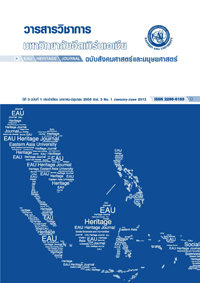รูปแบบการนำนโยบายกระจายอำนาจการบริหารงานบุคคลไปสู่การปฏิบัติ ในสำนักงานเขตพื้นที่การศึกษา
Keywords:
สำนักงานเขตพื้นที่การศึกษา, นโยบายกระจายอำนาจ, การบริหารงานบุคคล, Educational Service Area Offices, decentralization policy, personnel administrationAbstract
การวิจัยนี้มีวัตถุประสงค์เพื่อศึกษา (1) การนำนโยบายกระจายอำนาจการบริหารงานบุคคลไปสู่การปฏิบัติ ในสำนักงานเขตพื้นที่ในด้านสภาพปัจจัยสนับสนุนความสำเร็จและเสนอรูปแบบการนำนโยบายกระจายอำนาจ การบริหารงาน เครื่องมือที่ใช้เป็นแบบสอบถามและการสัมภาษณ์เชิงลึกประชากรในการวิจัยได้แก่ ผู้บริหาร ผู้อำนวยการหรือรองผู้อำนวยการสำนักงานเขตพื้นที่การศึกษา ผู้บริหารสถานศึกษาหรือนักวิชาการภายในและ ภายนอกกระทรวงศึกษาธิการ จำนวน 185 เขต โดยเลือกกลุ่มตัวอย่างด้วยการสุ่มอย่างง่าย จำนวน 123 เขต ซึ่งมีผู้ให้ข้อมูลจำนวน 615 คน สถิติที่ใช้ในการวิเคราะห์ข้อมูล ได้แก่ ค่าร้อยละ ค่าเฉลี่ย ค่าส่วนเบี่ยงเบนมาตรฐาน ค่าสัมประสิทธิ์สหสัมพันธ์พหุคูณ ผลการศึกษา พบว่า (1) มีการนำนโยบายกระจายอำนาจการบริหารงานบุคคลไปสู่ การปฏิบัติในสำนักงานเขตพื้นที่การศึกษา โดยรวมอยู่ในระดับมาก (2) พบปัจจัยสนับสนุนความสำเร็จในการนำนโยบาย กระจายอำนาจการบริหารงานบุคคลไปสู่การปฏิบัติ ประกอบด้วย ตัวแปรได้แก่ ความชัดเจนในเป้าหมายและ วัตถุประสงค์ของนโยบาย ภารกิจและการมอบหมายงาน มาตรการกำกับตรวจสอบ ประเมินผลและการกระตุ้น เสริมแรง สมรรถนะขององค์การ ภาวะผู้นำของผู้บริหารและความร่วมมือของผู้ปฏิบัติ การสนับสนุนจากส่วนกลาง และท้องถิ่นมีความสัมพันธ์กัน (3) รูปแบบที่นำเสนอ 4 องค์ประกอบหลักคือ มาตรการกำกับตรวจสอบ ประเมินผล และการกระตุ้นเสริมแรง สมรรถนะขององค์การ ความชัดเจนในเป้าหมายและวัตถุประสงค์ของนโยบาย การสนับสนุน จากส่วนกลางและท้องถิ่น
A Practical Model for Implementing the Decentralization Policy on Personnel Management in the Educational Service Area Offices
The objectives of this study are threefold: to study the condition of human resource decentralized policy which is implemented in Educational Service Area Offices, to identify factors affecting the effectiveness of the policy which is employed in Educational Service Area offices and, to propose a model for implementation of human resource decentralized policy in Educational Service Area Offices. Questionnaires and in-dept interview are used as research instruments to collect data from 123 area offices selected randomly from 185 offices compring of 615 respondents. The obtained data are analyzed by using statistical analysis such as percentage, average, standard deviation, and multiple regression Coefficient. The results manifested follows: (1) decentralized policy is implemented in Educational Service Area Offices at high level. (2) important factors the consist goal and policy objective, mission and assignment, regulation and monitoring, evaluation and motivation, organization performance, leadership of chief and cooperation of supporters, central and local government support, in for human resource participation policy implementation and have a positive relationship with the implementation success. (3) A model of implementing decentralization policy on personnel administration in the Educational Service Area Offices consists of four factors namely, regulation and monitoring, evaluation and motivation, organization performance, clarified goal and policy objective, and central an d local government support.




